Luke 24:13-49
Now on that same day two of them were going to a village called Emmaus, about seven miles from Jerusalem, 14and talking with each other about all these things that had happened. 15While they were talking and discussing, Jesus himself came near and went with them, 16but their eyes were kept from recognizing him. 17And he said to them, ‘What are you discussing with each other while you walk along?’ They stood still, looking sad. 18Then one of them, whose name was Cleopas, answered him, ‘Are you the only stranger in Jerusalem who does not know the things that have taken place there in these days?’ 19He asked them, ‘What things?’ They replied, ‘The things about Jesus of Nazareth, who was a prophet mighty in deed and word before God and all the people, 20and how our chief priests and leaders handed him over to be condemned to death and crucified him. 21But we had hoped that he was the one to redeem Israel. Yes, and besides all this, it is now the third day since these things took place. 22Moreover, some women of our group astounded us. They were at the tomb early this morning, 23and when they did not find his body there, they came back and told us that they had indeed seen a vision of angels who said that he was alive. 24Some of those who were with us went to the tomb and found it just as the women had said; but they did not see him.’ 25Then he said to them, ‘Oh, how foolish you are, and how slow of heart to believe all that the prophets have declared! 26Was it not necessary that the Messiah should suffer these things and then enter into his glory?’ 27Then beginning with Moses and all the prophets, he interpreted to them the things about himself in all the scriptures. 28 As they came near the village to which they were going, he walked ahead as if he were going on. 29But they urged him strongly, saying, ‘Stay with us, because it is almost evening and the day is now nearly over.’ So he went in to stay with them. 30When he was at the table with them, he took bread, blessed and broke it, and gave it to them. 31Then their eyes were opened, and they recognized him; and he vanished from their sight. 32They said to each other, ‘Were not our hearts burning within us while he was talking to us on the road, while he was opening the scriptures to us?’ 33That same hour they got up and returned to Jerusalem; and they found the eleven and their companions gathered together. 34They were saying, ‘The Lord has risen indeed, and he has appeared to Simon!’ 35Then they told what had happened on the road, and how he had been made known to them in the breaking of the bread.
When I received the news that my father died, I came home to discover that my husband had made a pot of tea. I know he did this because he knows I love tea and it’s a comfort…but I rather think it might also have been what I’d call an “ethnic reflex.†Both of us have English blood, you see, and that is what we do when the world collapses.
This is only a smaller version of a habit that is far more universal. When our friends found out about Dad’s death, they arrived at our door with lasagna and banana bread.
When people die, we eat. We eat as if to prod death with our life, to silently shout our ability to fill what death hollows out. We eat because it’s something we all do, and it helps us pick up the dropped stitches of one life and try to knit ourselves back together. We eat because it’s aggressively normal.
In the Gospel of Luke, Jesus spends most of his time eating. He ate with outcasts and sinners, rich and poor, healthy and broken – all of us, and every part of us, because each of us carry every category within if not without. Jesus ate with us to remind us that the great kingdom feast had come near to us and we could laugh at the paper tigers of self-imposed inequality. Jesus ate with us to remind us that all of us are linked by our mortality and our limitations, and we all need food to keep body and soul together. Jesus ate with us because it’s aggressively normalizing to eat with those whom we would rather not touch or talk to.
You could really say that this meant his whole life was shadowed by death – that every feast was funereal as well as joyful.
No wonder he was frustrated with these two poor disciples on their way home from Jerusalem, the great city of supposed redemption. They should have figured it out! No wonder it all seemed so obvious to him that he called them foolish.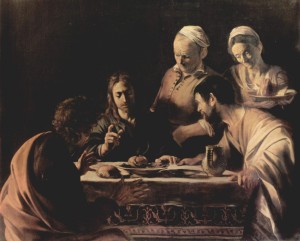
But let’s make space in our hearts for them. Let’s make much of those three very poignant and heartbreaking words: “We had hoped…†We had hoped Jesus would be the one to redeem Israel, to overturn things, to restore us to a blessedness that we could really see, to liberate us from the chains of imperial Rome. “We had hoped…â€
Don’t we all? Haven’t you ever hoped that you could rewind a conversation? Haven’t you ever hoped that a mistake was made and could be undone? Haven’t you ever hoped that your day was all a bad dream?
I’m going to suggest something that might sound a little radical. I think Jesus doesn’t quite hear this honest and very human echo of disappointment right away. Maybe that’s why he keeps going when they get to their destination.
We can cut him some slack too – he spent his morning re-arranging the truths of the cosmos.
But he’s not the only one. This might seem amazing and wonderful to us, but the best part – and maybe the scariest part – is that Jesus does not change things all by himself. That would be beautiful, but not particularly surprising. God is supposed to do ten amazing things before lunch.
What’s really astounding is that – I think – as God changes a cosmic truth, we change a Godly truth.
These two disciples – who are unnamed, because, let’s face it: they’re us – say, “Stay with us.â€
“Stay with us, because it is almost evening, and the day is nearly over.â€
Stay with us in the dark. Stay and eat. Even if it’s just the three of us, we want you here, eating with strangers, because it’s what we do when the shadows grow long and we are afraid of what comes after.
And so Jesus does – and at the end of the day, when we set out the meal for our guest, we discover that we were the treasured guests all along. We are given a gift: not just God’s presence, but God’s continued acceptance of our invitation.
A sacrament.
We are promised in this one beautiful moment, that every time we gather together and break bread in order to proclaim death is not the end of our story, God is with us, hosting this very strange meal that proclaims truth and love and eternal life.
We taste and see, and when we really see, we can’t stay in our seats. We jump up and run for miles, straight into the sunrise, without fully knowing or caring where the strength to do it even comes from.
All because we asked God to stay, because it’s getting dark.
That was all we had to do.
That’s all we have to do.
What a great scandal we Christians proclaim. How is this possible? In our records of the time, we can find mocking letters from Romans, ridiculing this ragtag group of miscreants who worshiped a god who died an embarrassing death as a convicted felon. This naked and bleeding man, who cried out “My God, my God, why have you forsaken me,†pierced and crowned with thorns, is our god? We even say this death is “good news!†Something must be terribly wrong here.
As we gaze at the cross we are not only looking at yet another chapter in the book of injustice. We are looking at the beginning of the most amazing shift in history we can imagine. We are not only looking at the unfolding of thousands of years’ worth of human history and events. We are looking at the voluntary disgracing of the source of life itself. The force that moved stars, formed earth, that breathed life into chaos before time began, is before us, having willingly given up amazing power in exchange for pain and death – all for love. This love is beautiful but also frightful in its fierceness. This love refuses to let us go in all of our destructive hatred and fear. This love says, “Show me what it is to live in the world I have given you. Give me all of your hurt and anger and pain and fear and let me experience it. I want to know you more deeply than you can know yourself. You can give me your worst and I will only accept. And after you have given me your worst, I shall gift to you my best. I shall gift to you my everything.â€
It is a most scandalous love. Mystics like Julian of Norwich, Richard Rölle, Teresa of Avila and John of the Cross wrote ecstatic volumes to its beauty and power. Everything – and nothing – can be said of this love. And we know this love not only because of the surrender to human suffering, but because of the morning that Scripture tells us awaits, the morning that undoes all death and sin and tears, if we only have faith that the sun will rise again.
Jesus was not alone on Golgotha. There were many people around him watching. While some of the people standing around made fun of Jesus, others were silent – in grief, horror, or awe.
One of these was the repentant thief, who affirmed Jesus’ innocence and asked that he be remembered when Jesus came into the kingdom. In Catholic and Eastern Orthodox tradition, this thief is given a name – Dismas or Dimas. Through reaching out to someone in pain, condemned unjustly, he received a beautiful affirmation: “Truly I tell you, today you will be with me in Paradise.â€
In the Gospel of John two more figures are placed at the foot of the cross: Jesus’ mother, Mary, and “the beloved disciple.†Jesus entrusts Mary to the care of this disciple, which was likely essential for Mary’s survival, as she likely had no one to care for her once her son was dead.
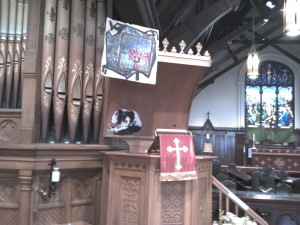 It is in the extension of one’s hand or heart that we are invited into deeper communion and relationship with the suffering beloved. In relationships God entrusts to us great responsibility. As a Jew, Jesus would have affirmed the covenant that was established between God and creation after the Flood in the Book of Genesis. Living in covenant or relationship is a great gift, and this gift should be celebrated in our lives by certain actions. Jesus sums up our half of the covenant in two commandments: “You shall love the Lord your God with all your heart, and with all your soul, and with all your mind,†and “You shall love your neighbour as yourself.â€
It is in the extension of one’s hand or heart that we are invited into deeper communion and relationship with the suffering beloved. In relationships God entrusts to us great responsibility. As a Jew, Jesus would have affirmed the covenant that was established between God and creation after the Flood in the Book of Genesis. Living in covenant or relationship is a great gift, and this gift should be celebrated in our lives by certain actions. Jesus sums up our half of the covenant in two commandments: “You shall love the Lord your God with all your heart, and with all your soul, and with all your mind,†and “You shall love your neighbour as yourself.â€
This is not a relationship that needs to be earned. Jesus does not demand a creed or confession from the thief before assuring him they will meet in Paradise. Likewise, he does not ask John to take care of Mary. He simply says, “This is your mother.†All that happened was a reaching out – by the thief in his defense of Jesus, and by the beloved disciple in remaining by Jesus’ side at the foot of the cross. The relationship is, already. We only have to reach out.
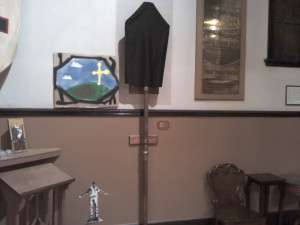 God did not try to escape any aspect of human experience. In the crucifixion of Jesus, God was accepting all of the pain of humanity at its worst.
God did not try to escape any aspect of human experience. In the crucifixion of Jesus, God was accepting all of the pain of humanity at its worst.
Crucifixion was a gruesome business. Although many people assume that death came from the nails in the wrists and feet, what really occurs is death by suffocation when the condemned is no longer able to hold his head up. It is a slow, agonizing form of execution, reserved for troublemakers, rabble-rousers, and insurrectionists. It’s easy to forget that when we wear our little gold crosses around our necks, we are essentially wearing electric chairs, or syringes filled with poison. The focus on the salvific aspects of Jesus’ death can make us lose sight of its truly shocking and scandalous nature. The Apostle Paul will not allow us to do so! He speaks of the “scandal†of the cross constantly in his letters, and marvels at God’s ability to transform such scandal into beauty and life.
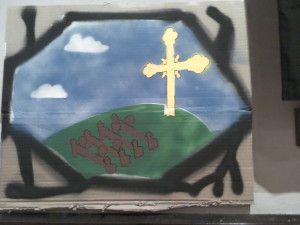
John 13:21-32
23One of his disciples—the one whom Jesus loved—was reclining next to him; 24Simon Peter therefore motioned to him to ask Jesus of whom he was speaking. 25So while reclining next to Jesus, he asked him, ‘Lord, who is it?’ 26Jesus answered, ‘It is the one to whom I give this piece of bread when I have dipped it in the dish.’ So when he had dipped the piece of bread, he gave it to Judas son of Simon Iscariot. 27After he received the piece of bread, Satan entered into him. Jesus said to him, ‘Do quickly what you are going to do.’ 28Now no one at the table knew why he said this to him. 29Some thought that, because Judas had the common purse, Jesus was telling him, ‘Buy what we need for the festival’; or, that he should give something to the poor. 30So, after receiving the piece of bread, he immediately went out. And it was night.
31 When he had gone out, Jesus said, ‘Now the Son of Man has been glorified, and God has been glorified in him. 32If God has been glorified in him, God will also glorify him in himself and will glorify him at once.
“Slowly blooms the rose within, slowly blooms the rose within.â€
Some time ago, the Anglican mystic Cynthia Bourgeault wrote a beautiful evening liturgy for one of the days in Holy Week, which included readings from the Song of Songs, the ritual anointing of our neighbours’ hands with oil (as Mary of Bethany did with Jesus’ feet in yesterday’s reading), and music including this chant. It was a moving and sensual experience that explored the mystic implications of the crucifixion.
Today’s passage reminded me of it, because, as I’ll show you, this story from John is masterfully told – even more than you might already think. The structure is so perfectly interlaced that it might be one of Marilyn’s Celtic knots…or a rose, a rich mystical symbol that suggests divine unity.
Let’s explore it together.
This story has a frame which we don’t hear in this particular passage. Think of it like the sepals, the little green leaves that give the blossom something to sit upon. These are composed of teaching; Jesus showing us how to behave, leading us by example. Here, several verses before our reading, Jesus washes feet. In the next chapter, several verses after our passage, he begins a discourse, which goes on for several more chapters. Scholars call it the Farewell Discourse. I call it, “Goodbye, I love you.â€
Both of these actions are also about death. There are clues in John that show us this. Jesus’ feet have been anointed by Mary of Bethany, and Satan has “put it into the heart of Judas†to betray Jesus. The forces to begin the ending are already in motion. So Jesus takes off his cloak. That’s a bad translation. He lays down his cloak – as he will later lay down his life.
He does this purposefully, with complete control. Not for John’s Jesus the desolate cry from the cross, “My God, my God, why have you forsaken me?†John’s Jesus says only, “It is finished.†He is in control.
Likewise, the Farewell Discourse – “Goodbye, I love you†– is a last will and testament.
The sepals teach us that the Christian life is constantly shadowed by kenosis – pouring out in order to be filled.
Now we’ve come to the next layer. This is the layer we would rather not think about, the one that keeps us up at night. These are the shadows between the petals.
The first shadow is Judas. After the washing of those precious feet, we have a heart hosting Satan. The lectionary we use is unfair to Judas, because we hear today’s story before we hear the foot-washing story, which we don’t hear until tomorrow. This, I think, tries to avoid the fact that Judas also had his feet washed. The foot-washing happens before Judas leaves.
How does that make you feel?
Personally, it takes my breath away.
And yet, still, with clean feet, Judas scuttles out – having been commanded by Jesus to do so.
Like Judas, we all have these shadows. As much as we’d like to pretend it is otherwise, we have them. We don’t have to scour our minds thinking about who we betrayed. It is just as easy, and probably far more common, to discover that we have betrayed ourselves. Do not despair. It’s our story. There’s no use crying over a bitten apple.
The second shadow is Peter. As usual he impulsively blurts out his commitment to stand by his love to the end, and of course, Jesus bursts his bubble, also as usual.
Once again, this is our story – if not to someone else, then to ourselves.
This too is our shadow, our darkness.
But what does the Gospel of John say about darkness?
Now we come to the petals, and peeling them back come to the very centre, the very heart, of the Christian life.
I’ll show you three petals.
First petal: A magic Johannine phrase (ring your bells – no, hammer them): And it was night.
Sounds like shadows again. Ah, but we’re not finished.
Second petal: Jesus says, “Now the Son of Man has been glorified.â€
Now? After the worst part of this story?
That’s why we call it the Mystery of Faith.
And we’re still not finished.
Third petal: “I give you a new commandment: to love one another.â€
Beautiful. Can’t we just end there? But remember: this is all layered with shadows. After the command to love, there is the whole-hearted intention to abide by that commandment: “Lord, I will lay down my life for you!†And then, of course, that harrowing truth of denial.
But shadows do not negate petals. They have no power over the existence of this plant, its scent, its colour, or its beauty.
They are a part of what makes it beautiful.
The light is shining in the darkness, and the darkness does not overcome it.
And that is not just a truth of God. It is a truth of the human heart: a fragile piece of flesh imprisoned within a cage of ribs, beating – and loving – in utter darkness, hidden but not negated by our precious flesh.
This Holy Week, stare down the darkness of the world reflected in this story, and sing with me.
“Slowly blooms the rose within, slowly blooms the rose within.â€
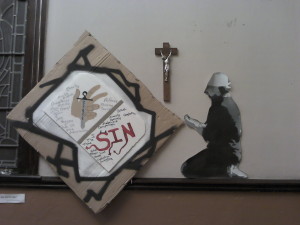 We all carry crosses of pain with us every day of our lives. Our hope and comfort is that Jesus also carried a cross of pain – not just his own but every cross there has ever been. There’s often a focus on Jesus carrying our sins, but it wasn’t just sin. It was despair, hatred, fear, and giving up. It was the starving Jewish child in the city behind him, the people of Europe ravaged by the Black Death fifteen hundred years later, African slaves, First Nations people in residential schools, German Jews in the gas chambers, the sobbing North American teen contemplating ending his life – even poisoned rivers and dying polar bears, victims of human greed and fear.
We all carry crosses of pain with us every day of our lives. Our hope and comfort is that Jesus also carried a cross of pain – not just his own but every cross there has ever been. There’s often a focus on Jesus carrying our sins, but it wasn’t just sin. It was despair, hatred, fear, and giving up. It was the starving Jewish child in the city behind him, the people of Europe ravaged by the Black Death fifteen hundred years later, African slaves, First Nations people in residential schools, German Jews in the gas chambers, the sobbing North American teen contemplating ending his life – even poisoned rivers and dying polar bears, victims of human greed and fear.
Jesus took it all and carried it for all of us – the whole family of the planet earth – willingly. He could easily have used the awesome power that he had used while walking on the water, or stilling the storm…but he did not. God invited God’s self into human existence and drained the cup dry. Christians proclaim that they too are called to carry the cross of the world’s pain and suffering.
Here’s the really amazing part: Jesus actually needed help with this cross. This is a beautiful moment in the passion narrative. Jesus is not Superman. He lays aside his sovereignty in these moments. God is dependent on us in this time and reaches out. There is never a moment when we are not being invited into deeper relationship. God willingly reaches out and says, “Help me. Teach me how to close the gap between you and me.†In this way, Jesus is like a lover. In this period of Lent we can ask ourselves where we are being invited into deeper relationship with God through helping others, the faces of Christ.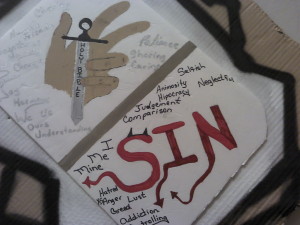
We are human beings, and we come by imperfection honestly. We are born with it. A baby may not necessarily be born “stainedâ€, but it is born into systems of oppression and isolation. It is now a separate person from its mother and can never go back. Many of us spend our entire lives searching for that lost feeling of wholeness.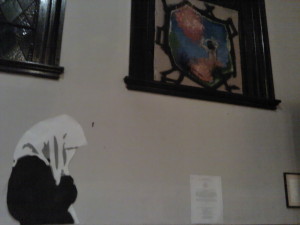
Our failings are a part of our humanity. We are all betrayed. We also all betray each other. At some point we un-learn trust and replace it with suspicion and fear. We betray our friends, our family, and our planet. Just as we are betrayed and we betray, we are condemned and we also condemn. We choose not to listen to someone who questions us because they make us uncomfortable, or maybe we don’t want to change. Plenty of voices who call us to be more are silenced in our time today. Likewise, sometimes we are silenced, or those closest to us may deny us at a time of need. Structures and institutions can also be sources of judgement. Sometimes we might feel like an insect underfoot, and sometimes we stand by watching helplessly while the machinery grinds someone else underfoot. Our culture contributes to this helplessness. Reality TV daily holds up lives that we are expected to laugh at and judge. This is only an extension of the culture that once gathered to watch public executions. Of course, if we see someone else being humiliated, we can easily tell ourselves that they deserve it. Nothing makes us feel better about our own shortcomings than comparing ourselves to others. This is only a reaction to our own feelings of inadequacy and loneliness.
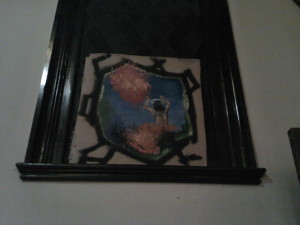 The Christian comfort in judgement is that Jesus fully understood our feelings because he experienced them. He was betrayed by Judas, condemned by his own religious leaders and the Roman State, denied by his best friend, and cruelly mocked by soldiers who put a fake crown and robe on him and spat in his face. Jesus accepted all of this as part of being human…and in a Christian worldview, that means that God accepted it and experienced it too. God, the source of all life, willingly gave up power in order to fully understand human frailty and brokenness.
The Christian comfort in judgement is that Jesus fully understood our feelings because he experienced them. He was betrayed by Judas, condemned by his own religious leaders and the Roman State, denied by his best friend, and cruelly mocked by soldiers who put a fake crown and robe on him and spat in his face. Jesus accepted all of this as part of being human…and in a Christian worldview, that means that God accepted it and experienced it too. God, the source of all life, willingly gave up power in order to fully understand human frailty and brokenness.
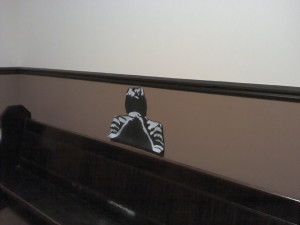 Many of us are taught, throughout our whole lives, that we need to be strong and stand up for ourselves. The values of our society point to a “pull yourself up by your own bootstraps†thinking that sees the weak as disposable and prayer as useless. In a world like this, we may learn to appear like a rock on the outside, but inside, we may be falling apart.
Many of us are taught, throughout our whole lives, that we need to be strong and stand up for ourselves. The values of our society point to a “pull yourself up by your own bootstraps†thinking that sees the weak as disposable and prayer as useless. In a world like this, we may learn to appear like a rock on the outside, but inside, we may be falling apart.
Lent is about recognizing and embracing our fallen-ness, weakness, and mortality. We take responsibility for the places where we have failed – personally and as a species – to act with integrity, stand up for justice, and live with humility. Our hopelessness may be from different sources, but they are all tied to the same human sense of despair. Maybe we betrayed someone. Maybe someone was dying and there was nothing we could do to save them. Maybe we were slaves to addiction. Whatever was happening to us, we were in a place where we found ourselves alone in our Garden of Gethsemane at night, and our sweat became like great drops of blood. We were bowed down under the weight of our fear and asked God to take away the pain that rested on us, or the pain that we knew was to come…and knew in our hearts that it wouldn’t happen.
What we might not have known at the time was that the pain was the beginning of a longer journey that somehow, against all odds, ended on a misty, troubling, beautiful morning.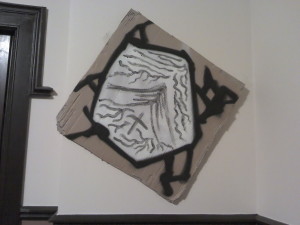
Hi, everyone!
As you all may or may not know, two years ago a friend and I put together a special art installation in a small urban parish for Lent and Holy Week. We called the project “Writing the Dark Nights of our Lives,” and, taking inspiration from graffiti artist Banksy, commissioned several artists inside and outside the parish to create six paintings and six accompanying figures for a stripped down version of the Stations of the Cross. The pieces were added over a period of several weeks, stuck right to the walls of the church as though they had been spray-painted there. All of this was accompanied by a blog and Twitter feed as well as accompanying sermons.
My main job was to co-ordinate, manage the blog, contribute to the Twitter feed, and help host “Writing the Dark Night Wednesdays,” where we opened up the church after Wednesday evening Eucharist and invited anyone who wished to come in, explore the art, and listen to music I provided. I also wrote six reflections for the stations, which were posted when each station was added, and then combined to create a liturgy where we actually walked these Stations of the Cross on Good Friday 2013.
The response from the parish was amazing, more than we ever could have asked or imagined. We had expected push-back, maybe even a little offense, but instead were met with deeply prayerful engagement.
My friend left that year shortly after the project finished to complete seminary training in Ontario. This year he has been emailing me to let me know that he has been sharing the liturgy with churches he has been working with. Apparently the response has been good – even former Primate Michael Peers called it “spectacular”!
Since we’ve had such a good response, I decided I would post the text I wrote with the Stations, along with photos of the paintings. There are six so we’ll have just enough time if I post one for each day of Holy Week.
Enjoy!
-Clarity
Passages cited can be found here and here.
“Are we there yet?â€
Who has suffered through the chorus of the song that doesn’t end? Tell your story, and make my mother proud.
I was never one of those kids. I managed to absorb the sound logic behind “We’ll get there when we get there†at a very early age. I’ve found that a lot of people seem to increasingly talk about patience as though it’s an inherent gift, and I really don’t think that’s true at all. Patience is a skill that must be built, tested, and nurtured. Like any skill, it gets better with practice, and since I am a child of a single working mom, I had plenty of chances to learn patience.
Likewise, trust. I had faith that when we did arrive at our destination my mother would tell me and give me time to get ready. I learned to wait for that voice.
Now there are times where waiting is something that takes very little effort. But there are times when waiting is almost impossible. Christmas morning. The baby’s arrival. The paycheque. The medical tests. The integration of loss, the sudden absence that drags all days into one day.
So while the complaint of the Israelites in today’s passage is pretty ridiculous – “We have no water and no food – and this food is gross!†– I can understand that years wandering through the wilderness would wear on a body, even a body kept alive through the power of magic rock water and angelic bread and heavenly quail. I can imagine that patience would be threadbare and faith would be running dry.
So the complaints rise up, and it seems like God has a little tantrum and throws snakes into the mix. One source I consulted for this sermon tries to let God off the hook: “The text doesn’t actually say that God sent the snakes because people were complaining!†Well, it’s not an unreasonable assumption. I can feel sorry for people who are stuck wandering the desert for generations, but I can really feel sorry for someone who has given and given and given and ends up taken for granted. Just before this passage in Numbers God helped the people win a huge military victory. Poisonous serpents might seem like overkill, but heck, they were already in the desert in abundance. And not to be a nitpicker, but serpents don’t generally bite people for no reason. Did God perhaps put serpents into people’s shoes? Maybe cut these wiggly little guys some slack.
So perhap it’s a bit silly to make excuses for God by suggesting that the snakes are not linked to the complaining of the people. But one thing to note is that at no point in the text is the word “punishment†explicitly named. The people tell Moses that they have sinned, but neither Moses nor God ever comes out and says the serpents are apunishment. So while it’s fair to say the serpents are linked to the people’s behaviour, perhaps what God was trying to communicate was more ambiguous and less human than, “You think you’ve got it bad now? Baby, you ain’t seen nothing yet.â€
Well, I read a fascinating midrash by an ancient Rabbi on this text that I thought rang true.
It had to be serpents…because it was a serpent in the Garden.
In Genesis, the first one to be punished is the serpent. What’s most important for today is the line “Upon your belly you shall go, and dust you shall eat all the days of your life.†Presumably the serpent did not slither before that day. A body was broken: the serpent was forever changed. A relationship was broken: between humankind and this species. In addition to this, the Hebrew word translated “poisonous†in English is actually more accurately translated “fiery†– and what was it that guarded the gate between Eden and the rest of the world once we were expelled? A fiery sword.
Echoes of Eden permeate this passage.
So as the people stumble around in the desert, remembering fondly their days of slavery and degradation, maybe God is reminding them, “Hey. Haven’t you learned anything? There was a real expulsion once.†And finally someone gets it, and they beg for help. And Moses creates this bizarre icon, called Nehushtan in the Book of Kings. It is bronze because the Hebrew word for bronze is like the Hebrew word for serpent – so it’s not just a serpent, it’s a serpent-y serpent. One English translation highlights this emphasis with the phrase “copper viper.†Perhaps, rather than focussing on a remnant of ancient folk medicine, we might understand this as an undoing of the serpent’s punishment – lifting up what had been condemned to crawl, and making a healer of what was once a source of enmity and fear, striking our heels while we struck its head. A broken body has been lifted up and made everlasting in bronze, and a broken relationship has been re-imagined, from enmity to healing.
You’ll notice that God does not take the serpents away. That’s never been God’s style. God’s honest like that, never choosing to erase the rough parts of a relationship. I think this is part of the everlasting truth of God’s drawing closer to us, having to learn to be awkward and broken, as we are, loving us for that earthy quality that after all comes straight from the divine hand and the divine breath.
But what does this have to do with “God so loved the world?â€
In the season of Lent, the sand of the wilderness gets into our nooks and crannies and slows us down. We feel the burning heat of the desert and focus on the sting of our separation from God. Our lives are full of wilderness space, and so is our world. We might forget to look at Nehushtan, the copper viper. Maybe Moses could make water burst forth from a rock, but how are we supposed to get water to nourish our patience and our faith in the desert? Where’s our magic staff? How can we possibly change things for the better when there is so much left barren and broken in our lives? How can we possibly come home to God when there is so much ignorance and fear and terror and apathy in the world that a thousand seasons of Lent could not be filled with penance enough to bring back Eden?
Once again, God makes foolishness out of our wisdom. God flips everything upside-down. God puts a crack in everything for the light to get in.
God becomes Nehushtan.
The Cross, symbol of humiliation, pain, mob “justice,†and the tyranny of Empire will become a symbol of triumph.
Like the serpent who deceived us being replaced by one who heals us, the tree that administered our expulsion is replaced by one that administers a new fruit, a fruit that gives us life, abundantly.
Creative, isn’t it? I hope you’d expect no less from your Creator.
So how should we respond?
We keep walking. The desert looks endless, and in a way it is, but there’s no fear in that. An earthly desert is actually packed full of secret life – how much more is the desert of a human life…or a heavenly desert?
God promises: There’s water in the rock. There’s healing in the serpent. There’s fruit on the tree. There’s a crack in everything – and the light is shining in.
God so loves the world: In the deepest wisdom of the created order, God chooses the foolishness of the world to make known the wisdom of the divine; chooses brokenness to bind up wholeness; chooses the profane to house the sacred. The truth of the world is transformation – the emptying out in order to be filled.
Jesus tells us it must be so, or there is no transformation.
It must be so, or we won’t get it.
And God wants us to get it. Reach out, and take it.
It’s yours.
It’s ours.









